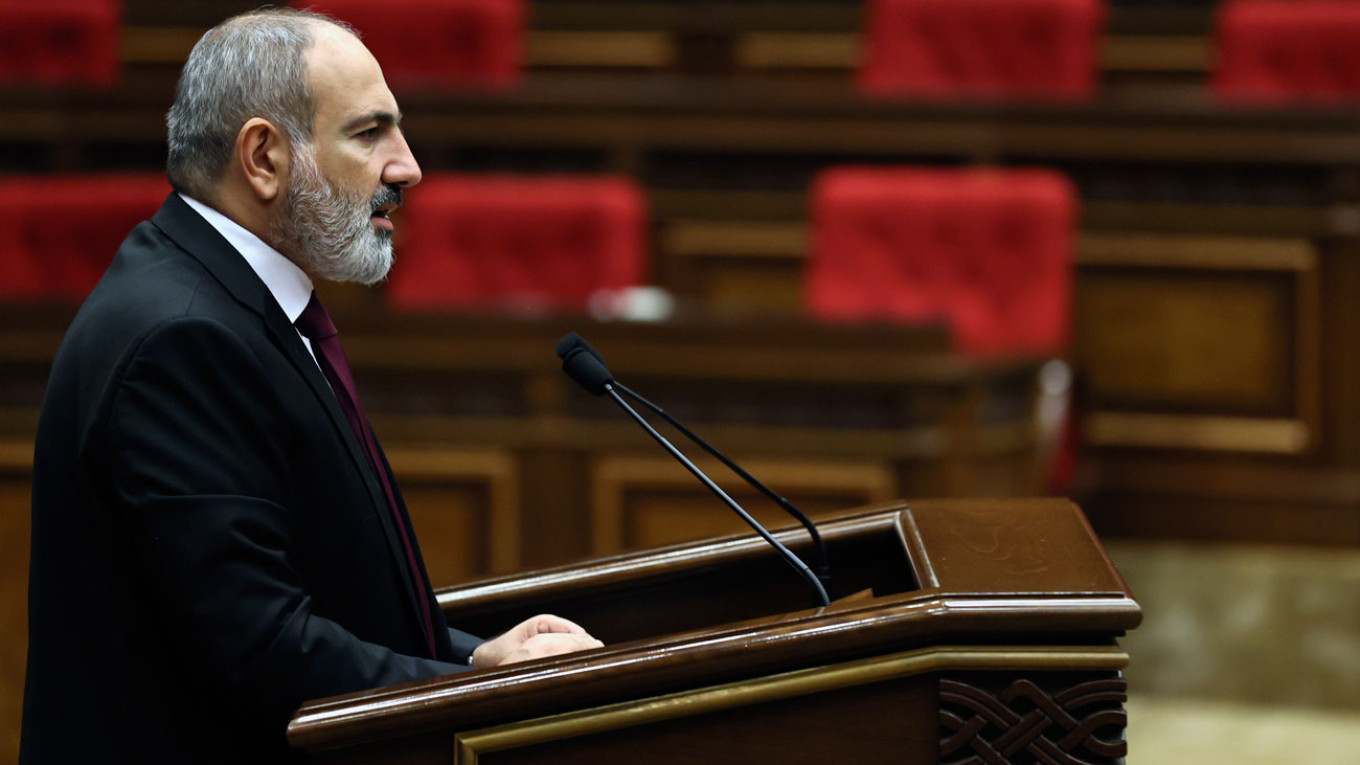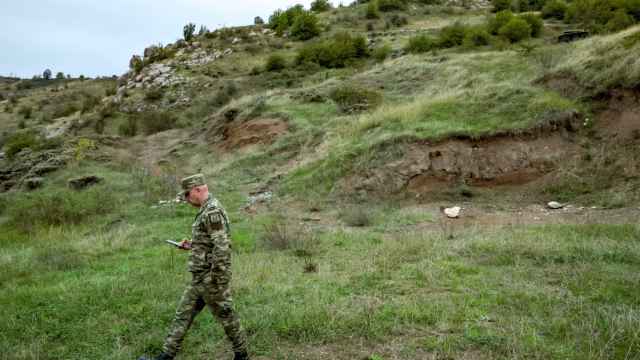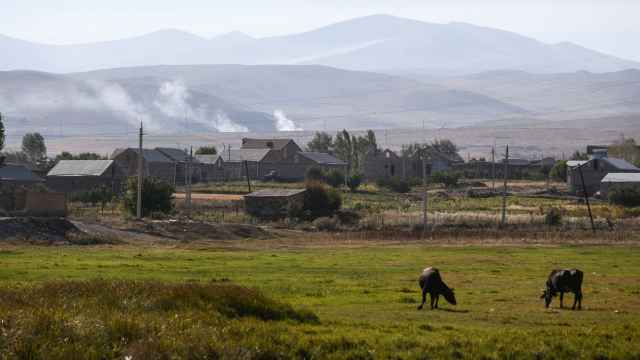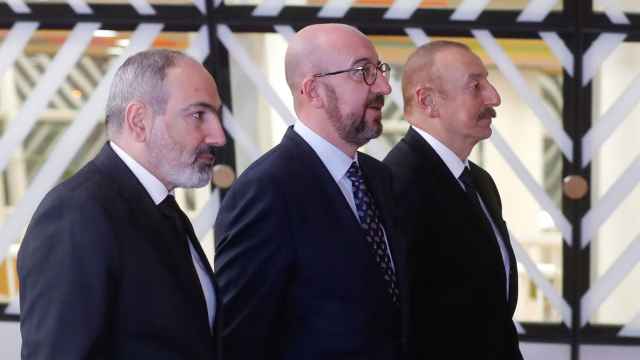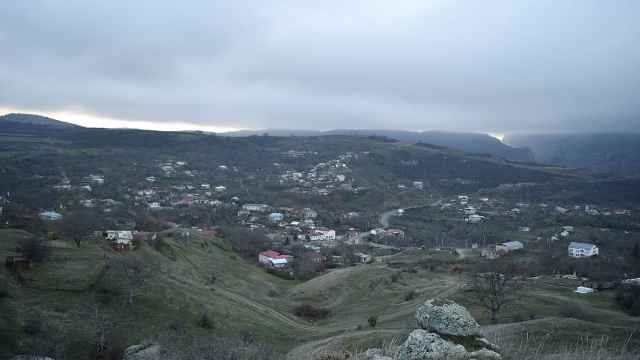Azerbaijan on Wednesday offered to return the bodies 100 Armenian troops killed in the worst clashes between the historic rivals since their war in 2020.
The offer came just a day after fighting erupted between the arch foes, and each accused the other of violating a fragile truce that one analyst described as "neither war, nor peace."
Azerbaijan's commission on prisoners of war called for a ceasefire and said it was "ready to unilaterally hand over the bodies of 100 Armenian servicemen to Armenia."
Yerevan confirmed Wednesday that 105 of its troops were killed in the recent clashes, while Baku reported the death of 50 its servicemen.
Russia announced on Tuesday that it had negotiated a ceasefire but on Wednesday, Armenia's defense ministry said "the enemy re-launched its attack by using artillery, mortar, large-caliber firearms in the directions of Jermuk, Verin Shorzha" on the border.
"Azerbaijan's military-political leadership continues its acts of aggression against the sovereign territory of Armenia, targeting both military and civilian infrastructure," Wednesday's statement said.
The ministry spokesman Aram Tonoyan said later on Wednesday that Azerbaijani rocket-artillery shelling intensified, including on peaceful settlement."
The Azerbaijani defense ministry said Armenian forces "violated the ceasefire... and shelled Azerbaijani positions near Kelbajar and Lachin with mortars and artillery."
Tuesday's escalation came as Yerevan's closest ally Moscow is distracted by its six-month-old war against Ukraine.
Russian President Vladimir Putin's spokesman, Dmitry Peskov, said that "Definitely, tensions persisted" Wednesday on the Armenian-Azerbaijani border.
He said a delegation of the Collective Security Treaty Organization (CSTO) — a Moscow-led grouping of ex-Soviet republics of Armenia, Belarus, Kazakhstan, Kyrgyzstan, Tajikistan and Uzbekistan — was due in Yerevan later on Wednesday.
On Tuesday, Armenia's security council asked for military help from Moscow, which is obligated under the treaty to defend Armenia in the event of foreign invasion.
Peace efforts 'undone'
The Ukraine conflict changed the balance of force in the region as Russia — which deployed thousands of peacekeepers in the region afer the 2020 war — is increasingly isolated.
The European Union has since led the Armenia-Azerbaijan normalization process, which involves peace talks, border delimitation and the reopening of transport links.
Analyst Gela Vasadze of the Georgian Strategic Analysis Center said the latest escalation "has undone EU-led efforts to bring Baku and Yerevan closer to a peace deal."
"Brussels agreements are now practically nullified," he said, adding that the clashes "have further radicalized public opinion in both countries."
During EU-mediated talks in Brussels in May and April, Azerbaijan's Ilham Aliyev and Armenia's Nikol Pashinyan agreed to "advance discussions" on a future peace treaty.
Armenia's rights ombudsperson, Kristina Grigoryan, said "at least 2,750 people were forced to flee their homes" as a result of Azerbaijani shelling.
In the village of Sotk, local resident Vardanush Vardanya, 66, told AFP that "women and children were evacuated" after Azerbaijani forces shelled a nearby Armenian military base.
"I've stayed and watched houses burning as the shelling continued."
Baku denied having targeted Armenia's civilian infrastructure.
In Yerevan, emotions ran high among relatives of wounded Armenian servicemen, as they gathered outside a military hospital on Tuesday night.
"We must fight for our lands, for our homeland and for our country. Victory will be ours, if not today, then tomorrow. We are unbreakable," one of the relatives, Sokrat Khachaturyan, 65, told AFP.
'Neither war, nor peace'
On Tuesday, Armenia appealed to world leaders for help over the latest fighting.
The European Union, United States, France, Russia, Iran and Turkey all expressed concern over the escalation and called for an end to fighting.
The neighbors fought two wars — in the 1990s and in 2020 — over the disputed Nagorno-Karabakh region, Azerbaijan's Armenian-populated enclave.
The six weeks of fighting in autumn 2020 claimed the lives of more than 6,500 troops from both sides and ended with a Russian-brokered ceasefire.
Under the deal, Armenia ceded swathes of territory it had controlled for decades and Moscow deployed about 2,000 Russian peacekeepers to oversee the fragile truce, which analyst Vasadze called "neither war, nor peace."
Ethnic Armenian separatists in Nagorno-Karabakh broke away from Azerbaijan when the Soviet Union collapsed in 1991. The ensuing conflict claimed around 30,000 lives.
A Message from The Moscow Times:
Dear readers,
We are facing unprecedented challenges. Russia's Prosecutor General's Office has designated The Moscow Times as an "undesirable" organization, criminalizing our work and putting our staff at risk of prosecution. This follows our earlier unjust labeling as a "foreign agent."
These actions are direct attempts to silence independent journalism in Russia. The authorities claim our work "discredits the decisions of the Russian leadership." We see things differently: we strive to provide accurate, unbiased reporting on Russia.
We, the journalists of The Moscow Times, refuse to be silenced. But to continue our work, we need your help.
Your support, no matter how small, makes a world of difference. If you can, please support us monthly starting from just $2. It's quick to set up, and every contribution makes a significant impact.
By supporting The Moscow Times, you're defending open, independent journalism in the face of repression. Thank you for standing with us.
Remind me later.


